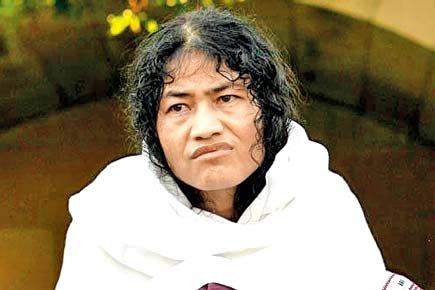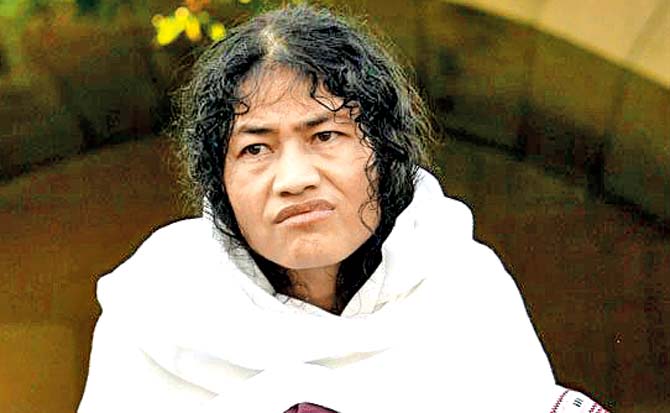Imagine, when Irom Sharmila Chanu called off what is described as the world's longest fast of 16 years, she was booed by the locals. Leaving her hospital-prison this week, after a decade-and-half of solitary confinement for the crime of "attempted suicide", this woman of indomitable courage from Manipur, had nowhere to go

 Imagine, when Irom Sharmila Chanu called off what is described as the world's longest fast of 16 years, she was booed by the locals. Leaving her hospital-prison this week, after a decade-and-half of solitary confinement for the crime of "attempted suicide", this woman of indomitable courage from Manipur, had nowhere to go. She was scorned by her followers because she had unilaterally declared that, disappointed by the result of her fast, she was calling it off, and would like to contest elections "to get our voices heard at the Centre," and to marry. Politics was a no-no, but the shaadi was the clanger.
Imagine, when Irom Sharmila Chanu called off what is described as the world's longest fast of 16 years, she was booed by the locals. Leaving her hospital-prison this week, after a decade-and-half of solitary confinement for the crime of "attempted suicide", this woman of indomitable courage from Manipur, had nowhere to go. She was scorned by her followers because she had unilaterally declared that, disappointed by the result of her fast, she was calling it off, and would like to contest elections "to get our voices heard at the Centre," and to marry. Politics was a no-no, but the shaadi was the clanger.

ADVERTISEMENT
Irom, of course, had undertaken the fast for the repeal of the Armed Forces (Special Powers) Act (AFSPA), which allows troops in the North East to kill suspects without prosecution, and remains in place. But in fact, the Supreme Court struck down their "absolute immunity" last month. Her supporters were outraged that the woman, whom they had unilaterally appointed as a goddess, was doing ordinary, un-goddessy things such as falling in love-shove and planning a shaadi-vaadi. 'Back up onto your pedestal, goddess,' was the firm message from the public and her political rivals. Irom is much easier to 'handle' when she's up there, symbolic, immobile and out of the way, so that others can keep power to themselves — or continue doing whatever they're doing, undisturbed.
Inspired by Mahatma Gandhi, Irom had been practising non-violent resistance, not by causing suffering to the oppressor, but to herself, in the hope of awakening the oppressor's conscience. Of course, there was the presumption of the latter. She had vowed not to eat, drink, comb her hair or look in a mirror — or meet her own mother — until AFSPA was repealed. For all these near-mythical vows, few photographs spoke as eloquently as one which showed Irom sitting on a bed, strewn with books, lingerie, a towel, plastic bags and soft toys. She loves PG Wodehouse, grew flowers for company, and kept two guinea pigs as pets. Not exactly your DIY goddess. Moreover, Manipuri insurgent groups have banned Bollywood, and Irom's real-life Bollywood story has got the locals even more riled. Irom's partner Desmond Coutinho, an African-born British citizen of Indian origin, wrote to Irom after reading about her in a book, and after exchanging letters, they fell in love. Locals complain that he's a dheela guy, travelling and practising meditation, with apparently "no property, fixed address or steady income."
In fact, Manipur has a long history of women's struggles. Nor has Irom's fast been in vain: anti-AFSPA protests started in four districts of Manipur last week, and members of Extra Judicial Execution Victim Families, set up from the proceeds of Irom's international awards, continue their struggle in the Supreme Court. But Irom's body and mind remain a battleground, as her life lurches between the mythical and the banal. Her story reminds me of Satyajit Ray's Devi, in which a lovely young bride descends into madness after her father-in-law's blind faith turns her into a goddess.
There's also Rabindranath Tagore's drama Chitrangada — also adapted into a film by Rituparno Ghosh — in which the king of Manipur raises his daughter Chitrangada as a man, a warrior. When she falls in love with Arjun, she asks Madan, the god of love, to make her more feminine. But when Manipur is attacked, the warrior princess turns masculine again, yet Arjun loves her even more. Who knows if Irom's story will get Tagore's — or Bollywood's — ending? Meanwhile, she is keen to just get on with her life. "I don't miss food anymore, but I remember it. The taste," she once told Basharat Peer, writing in Al-Jazeera. "At home, I ate everything we cooked, but sagyam pomba, a vegetable curry, was my favourite. I recently ate it in my dream. Maybe that is a sign, a blessing of the gods."
Meenakshi Shedde is South Asia Consultant to the Berlin Film Festival, award-winning critic, curator to festivals worldwide and journalist. Reach her at meenakshishedde@gmail.com
 Subscribe today by clicking the link and stay updated with the latest news!" Click here!
Subscribe today by clicking the link and stay updated with the latest news!" Click here!







